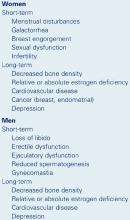The search for the hidden depressant
A teenager with longstanding ADHD and schizoaffective disorder lapses quickly into a deep depression with manic and suicidal features. Her doctors desperately seek the cause of this sudden downturn.
That day, a nurse informs the inpatient child/adolescent psychiatrist that Ms. G has requested extra hospital gowns. Ms. G later reveals that for about 4 months she has been producing a milky discharge from both breasts, and that the flow has been increasing in frequency and quantity. She adds that she has not menstruated for almost 5 months and complains of breast tenderness.
What do Ms. G’s latest symptoms suggest? How will your response to these symptoms affect treatment?
Drs. Yu’s and Maguire’s observations
Complaints of menstrual irregularities, breast tenderness, and galactorrhea should arouse suspicions of hyperprolactinemia. Because tumors that raise prolactin levels are rare, medications are the most likely culprit in Ms. G’s case. Dopamine blockade within the tuberoinfundibular tract is the mechanism of action behind prolactin elevation.4
Prolactin levels in patients with schizophrenia are generally normal (1 to 25 mg/L) prior to treatment,5 but have been known to increase with use of typical antipsychotics. The atypical antipsychotic risperidone has been associated with dose-related increases in plasma prolactin concentration, although Kleinberg et al found no correlation between risperidone-induced plasma prolactin concentrations and adverse events.6
Figure 2 POSSIBLE ADVERSE EFFECTS OF HYPERPROLACTINEMIA8
Prolactin-sparing atypical antipsychotics such as olanzapine, quetiapine, ziprasidone, and aripiprazole may cause a transient prolactin increase in the first few weeks of use. These levels tend to remain within the normal range before decreasing to baseline levels or lower.7,8
Prolactin elevation in women may lead to an estrogen deficiency, causing changes in mood and cognition and psychopathology9 that can manifest as increased depression, anxiety, and hostility.10 Hyperprolactinemia can also cause depression in men, though the mechanism of action is unknown.
Prolactin elevation can lead to numerous other health disturbances (Figure 2). When screening women who are taking antipsychotics, ask about menstrual irregularities, sexual dysfunction, breast tenderness, and galactorrhea. Ask male patients about a loss of libido, erectile dysfunction, ejaculatory dysfunction, and gynecomastia.
When hyperprolactinemia becomes apparent, we suggest discontinuing the offending drug and, if necessary:
- switching to a prolactin-sparing atypical antipsychotic
- or trying another agent, such as bromocriptine or pergolide, if switching to another antipsychotic is infeasible.10,11
Baseline prolactin levels should be measured before starting any prolactin-elevating antipsychotic. Because prolactin levels may not correlate with severity of clinical symptoms, the net change in these levels may be a better indicator.4 If prolactin levels exceed 100 mg/L, consider an MRI with fine cuts though the sellae to check for a primary adenoma.4
Conclusion: A cause is found
An MRI of Ms. G’s head is normal, but her serum prolactin level is 125 μg/L. Her risperidone is tapered off, and olanzapine, 10 mg at bedtime, is started with her mother’s consent. Two days later, her prolactin level drops to 85 μg/L. Notable improvement is reported on day seven of hospitalization; she is sleeping and eating well with no suicidal or homicidal ideations and notes no psychotic symptoms. She is discharged that day.
Two weeks later, Ms. G’s improvement continues. Lab tests reveal normal prolactin levels. Over the next few months, she remains stable, attends school, and takes her medications with no adverse effects.
Related resources
- Maguire GA. Prolactin elevation with antipsychotic medications: mechanisms of action and clinical consequences. J Clin Psychiatry 2002; 63(suppl 4):56-62. Available at: www.psychiatrist.com/supplenet/v63s04/v63s0408.pdf. Accessed March 11, 2003.
Drug brand names
- Aripiprazole • Abilify
- Dextroamphetamine sulfate • Dexadrine
- Divalproex sodium • Depakote
- Fluoxetine • Prozac
- Mestranol • Necon 1/50
- Norethindrone • Activella
- Pergolide • Permax
- Olanzapine • Zyprexa
- Quetiapine • Seroquel
- Risperidone • Risperdal
- Ziprasidone • Geodon
Disclosure
Dr. Yu receives research/grant support from, is a consultant to, and/or is a speaker for Cephalon Inc., Eli Lilly and Co., Novartis Pharmaceuticals Corp., and Pfizer Inc.
Dr. Maguire receives research/grant support from, is a consultant to, and/or is a speaker for Eli Lilly and Co., Pfizer Inc., Forest Laboratories, and GlaxoSmithKline.







